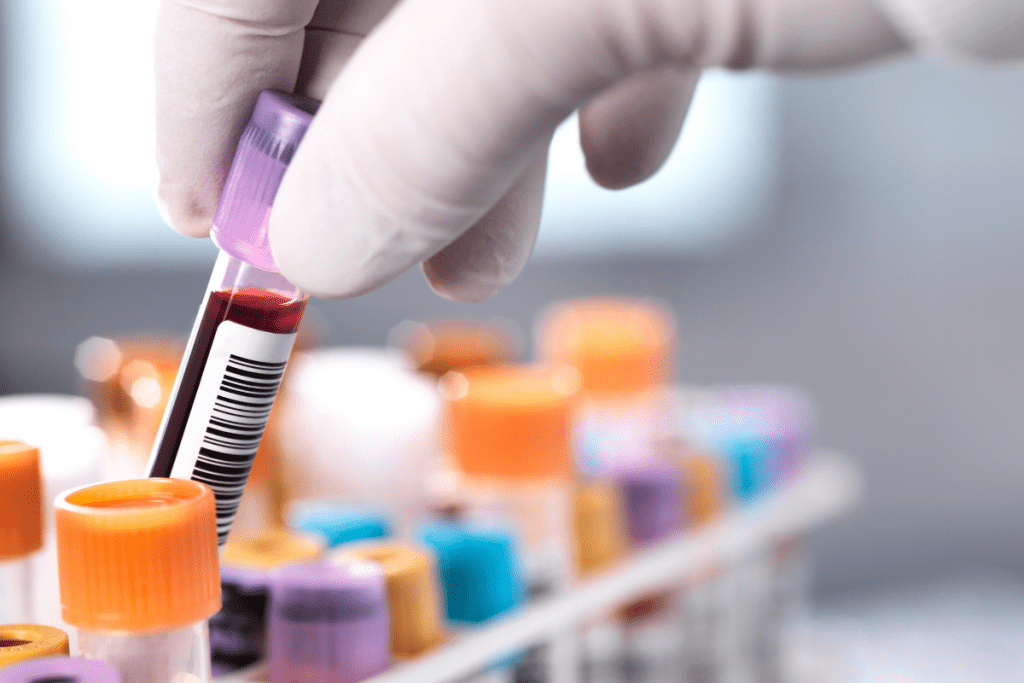
Did you know that blood disorders affect millions of people worldwide? Some conditions are not diagnosed until symptoms get severe. A hematology test is key for diagnosing and tracking blood-related issues. Knowing when to get tested can save lives.
Medical experts see the value of hematology tests in top-notch healthcare. A hematologist is vital in finding and treating blood disorders. It’s important to know when to seek their help for the best care.
Key Takeaways
- Understanding the importance of hematology tests in diagnosing blood disorders.
- Recognizing the role of a hematologist in treating blood-related conditions.
- Identifying when to seek medical attention for blood-related symptoms.
- The significance of early diagnosis and treatment for blood disorders.
- What to expect during a consultation with a hematologist.
What is a hematologist?

A hematologist is a medical expert who helps diagnose and treat blood-related issues. Blood disorders can be simple, like anemia, or complex, like leukemia.
Definition and Specialization
A hematologist is a doctor with deep knowledge in blood diseases. They understand blood components and disorders well.
They deal with many blood problems, from clotting issues to blood cancers. They keep up with new research and treatments in hematology.
Training and Qualifications
To be a hematologist, one needs a lot of medical training. This includes medical school, internal medicine residency, and a fellowship in hematology.
Hematologists can read complex blood tests, diagnose blood disorders, and create treatment plans. Their skills show they know how to handle blood and bone marrow issues.
Knowing what a hematologist does helps patients see the value of their care. They are key in managing chronic blood conditions and diagnosing complex disorders.
Understanding hematology and blood disorders
Hematology is the study of blood and its disorders. It’s a key field in medicine for diagnosing and treating health issues. We’ll explore the science behind it and look at the blood components checked in a hematology test.
The Science of Hematology
Hematology is a branch of medicine that deals with blood disorders. It looks at blood cells like red and white blood cells and platelets. This helps find problems and diagnose conditions such as anemia and infections.
The science of hematology focuses on blood’s complex functions. Blood is made up of several key elements. Each one is important for our health:
- Red Blood Cells (RBCs): Carry oxygen throughout the body.
- White Blood Cells (WBCs): Fight infections and diseases.
- Platelets: Help blood clot and prevent bleeding.
- Plasma: The liquid part of blood that carries cells and substances.
Common Blood Components Examined
In a hematology test, many blood components are checked. This helps diagnose and monitor blood disorders. Some of these components include:
- Hemoglobin (Hb): A protein in red blood cells that carries oxygen.
- Hematocrit (Hct): The proportion of red blood cells in blood.
- White Blood Cell Count: Shows if there’s an infection or inflammation.
- Platelet Count: Checks the number of platelets, important for clotting.
Knowing about these components and their roles is key for diagnosing and managing blood disorders.
Hematologists use this knowledge to understand a patient’s health. They then create the right treatment plans.
Types of hematology tests
Knowing about different hematology tests helps patients understand their health journey. These tests are key for diagnosing and managing blood disorders. They check various aspects of blood health.
Complete Blood Count (CBC)
A Complete Blood Count, or CBC, is a common test. It looks at red, white blood cells, and platelets. It’s important for spotting anemia, infections, and other diseases.
Components of a CBC:
- Red Blood Cell Count
- White Blood Cell Count
- Platelet Count
- Hemoglobin
- Hematocrit
| CBC Component | Normal Range | Significance |
| Red Blood Cell Count | 4.32-5.72 million cells/mcL | Helps diagnose anemia or polycythemia |
| White Blood Cell Count | 3.5-10.5 thousand cells/mcL | Indicates presence of infection or inflammation |
| Platelet Count | 150-450 thousand cells/mcL | Assesses risk of bleeding or clotting |
Coagulation Tests
Coagulation tests check if blood can clot properly. They’re key for diagnosing bleeding disorders like hemophilia or excessive clotting.
Common Coagulation Tests:
- Prothrombin Time (PT)
- Activated Partial Thromboplastin Time (aPTT)
- International Normalized Ratio (INR)
“Coagulation tests help us understand how well a patient’s blood can form clots, which is vital for managing blood clotting issues.”
Bone Marrow Tests
Bone marrow tests look at the spongy tissue in bones like hips and thighbones. This tissue makes blood cells. These tests help find problems with blood cell production.
Types of Bone Marrow Tests:
- Bone Marrow Aspiration
- Bone Marrow Biopsy
Understanding hematology tests helps patients grasp their health journey. Each test gives important info for diagnosing and treating blood-related issues.
Common symptoms that warrant seeing a hematologist
Some symptoms need a hematologist’s help for diagnosis and treatment. Hematologists are experts in blood-related conditions. Spotting these signs early can lead to better health outcomes.
Unexplained fatigue and weakness
Feeling tired or weak without a clear reason might mean a blood disorder. Unexplained fatigue could be anemia or leukemia. If tiredness affects your daily life, talk to a healthcare provider.
Abnormal bleeding or bruising
Abnormal bleeding or bruising might mean a clotting disorder. Unusual bruising, prolonged bleeding, or frequent nosebleeds are signs to see a hematologist.
Persistent infections
Recurring infections could mean a problem with your immune system. Frequent infections might show a white blood cell issue. A hematologist can help with immune system problems.
Swollen lymph nodes
Swollen lymph nodes could be a sign of infection or lymphoma. If your lymph nodes are always swollen, see a healthcare provider. They might send you to a hematologist.
| Symptom | Possible Condition | Specialist |
| Unexplained Fatigue | Anemia, Leukemia | Hematologist |
| Abnormal Bleeding | Blood Clotting Disorder | Hematologist |
| Frequent Infections | Immune System Disorder | Hematologist/Immunologist |
| Swollen Lymph Nodes | Lymphoma, Infection | Hematologist/Oncologist |
Blood disorders diagnosed by hematologists

Hematologists are key in diagnosing and treating blood disorders that affect millions. These disorders can greatly impact a person’s life. So, getting a correct diagnosis quickly is very important.
Anemia and Related Conditions
Anemia means not having enough healthy red blood cells. This makes it hard for the body to get enough oxygen. Hematologists deal with different types of anemia, like:
- Iron deficiency anemia
- Vitamin deficiency anemia
- Anemia of chronic disease
- Sickle cell anemia
Each anemia type has its own cause and treatment. Hematologists help find the cause and plan the best treatment for each patient.
Blood Clotting Disorders
Blood clotting disorders happen when blood doesn’t clot right. This can cause too much bleeding or clots. Common ones include:
- Hemophilia
- Von Willebrand disease
- Deep vein thrombosis (DVT)
- Pulmonary embolism
Hematologists use treatments like clotting factor therapy and medicines to stop clots.
Blood Cancers
Blood cancers affect the blood, bone marrow, and lymphatic system. They include leukemia, lymphoma, and multiple myeloma. Hematologists are experts in diagnosing and treating these cancers with:
- Chemotherapy
- Targeted therapy
- Immunotherapy
- Bone marrow transplantation
Early treatment is key to managing blood cancers. Hematologists work with a team to give patients the best care.
When your primary care physician might refer you to a hematologist
Your primary care doctor is key in watching over your health. They often spot issues that need a specialist’s help. If they find abnormal blood test results, they might send you to a hematologist.
Abnormal Blood Test Results
Abnormal blood test results can signal a problem. Some common signs that might lead to a referral include:
- Unusual white blood cell counts
- Low red blood cell count or anemia
- Abnormal platelet counts
- Unusual clotting or bleeding tendencies
These signs can point to blood disorders like anemia or leukemia. A hematologist can figure out the cause.
Specialized Treatment Needs
Some health issues need more than basic medical knowledge. Hematologists handle complex cases, including:
- Blood cancers such as leukemia, lymphoma, and myeloma
- Clotting disorders like hemophilia
- Anemia and related conditions
- Bone marrow disorders
By sending patients to a hematologist, primary care doctors make sure they get the best care for their condition.
Is it serious to be referred to a hematologist?
Being referred to a hematologist might seem serious, but it doesn’t always mean you have a life-threatening condition. It’s important to remember that seeing a specialist is a step towards getting the right care for your health. It’s not always a cause for alarm.
Understanding the significance of a referral
Your primary care doctor might send you to a hematologist if they find something that needs special attention. Hematologists are experts in blood disorders. They help with issues related to blood cells’ production, function, or health.
Reasons for a referral include abnormal blood tests, symptoms of blood disorders, or conditions that need ongoing care. By visiting a hematologist, you get access to advanced tests and treatments that fit your needs.
Non-cancerous conditions treated by hematologists
Hematologists don’t just treat blood cancers. They also handle non-cancerous conditions. These include anemia, bleeding disorders like hemophilia, and clotting disorders such as deep vein thrombosis (DVT). They also manage sickle cell disease and thalassemia, which affect hemoglobin production.
| Condition | Description | Treatment Approach |
| Anemia | A condition characterized by low red blood cell count or hemoglobin level. | Iron supplements, dietary changes, or addressing underlying causes. |
| Bleeding Disorders | Conditions like hemophilia that affect the blood’s ability to clot. | Replacement therapy, clotting factor concentrates, or gene therapy. |
| Clotting Disorders | Conditions such as DVT that lead to inappropriate blood clotting. | Anticoagulant medications, lifestyle changes, or mechanical interventions. |
Knowing that hematologists treat many conditions can be reassuring. Whether you have a non-cancerous issue or a more serious diagnosis, a hematologist is there to help. They provide the care and support you need.
What to expect at your first hematology appointment
At your first visit, you’ll get a detailed check-up. This includes looking over your medical history, a physical exam, and maybe more tests. This helps us figure out what’s going on and how to help you.
Medical History Review
We start by going over your medical history. We’ll talk about your symptoms, past health issues, and any medicines you’re taking. Knowing your health history is key to spotting any patterns or causes of your condition.
Physical Examination
Next, we do a physical exam to find signs of blood disorders. We’ll check for enlarged lymph nodes or spleen, look for bruises or pale skin, and check your overall health.
Additional Testing
Depending on what we find, we might do additional tests. These could be blood tests, bone marrow biopsies, or other tests to learn more about your condition.
Treatment Discussion
After we have a diagnosis, we’ll talk about your treatment options. This could be medication, lifestyle changes, or other treatments. We want to make sure you understand your treatment plan and what’s next.
By the end of your first visit, you’ll know more about your condition and how we’ll manage it. We’re here to give you caring and thorough care.
How to prepare for a hematology test
Knowing what to do before and during a hematology test is key. It can greatly affect the test’s outcome. To prepare, follow a few steps that help get accurate results and make the process easier.
Before your appointment
To get ready for your hematology test, follow these guidelines before your appointment:
- Inform your doctor about any medications you’re taking. Some might need to be paused or adjusted before the test.
- Follow any specific instructions from your healthcare provider. This might include fasting or avoiding certain foods.
- Wear comfortable clothing that makes it easy to access your arm for blood sampling.
- Be ready to give a list of your medical history. Include any previous blood disorders or conditions.
During your appointment
During the hematology test, you can expect the following:
- A healthcare professional will collect a blood sample, usually from a vein in your arm.
- The blood sampling process is quick and usually painless.
- You might be asked to provide more information or answer questions about your medical history.
- After the sample is collected, it will be sent to a laboratory for analysis.
By knowing what to expect before and during your hematology test, you can make the process smoother and more successful.
Insurance and referrals for hematologist visits
Visiting a hematologist can be a big step. Knowing about insurance and referrals is key. We’re here to help you understand the healthcare system better.
Do you need a referral to see a hematologist?
Whether you need a referral to see a hematologist depends on your insurance and network. Some plans need a referral from your primary doctor. Others let you see specialists like hematologists without one.
To find out if you need a referral, talk to your insurance provider. They can tell you what your plan requires.
Insurance coverage for hematology services
Insurance for hematology services can change a lot. Most plans cover tests and treatments from hematologists. But, what’s covered can depend on your plan.
| Service | Typical Coverage | Factors Influencing Coverage |
| Initial Consultation | Often covered | Network participation, copay/coinsurance |
| Diagnostic Tests (e.g., CBC) | Usually covered | Medical necessity, network |
| Treatment Plans | Varies by plan | Type of treatment, insurance formulary |
It’s important to check your insurance plan’s details or call your insurer. Also, talk to your hematologist’s office about your insurance. This will help you know what to expect.
Interpreting hematology test results
It’s key to understand your hematology test results to diagnose and manage blood disorders. When you get your test results, knowing how to interpret them is vital.
Understanding Normal Ranges
Hematology test results come with reference ranges. These show the normal values for the tests. These ranges might differ slightly between labs but give a standard to compare your results against.
A complete blood count (CBC) test checks your blood’s components like hemoglobin and white blood cell count. Knowing if your results are within the normal range helps decide if more tests are needed.
What Abnormal Results Might Indicate
Abnormal hematology test results can point to various health issues. For example, an odd white blood cell count might mean an infection or a bone marrow problem.
Talking to a healthcare professional is key to understanding your test results. They can offer context and suggest more tests or treatment if needed.
Common implications of abnormal results include:
- Anemia or other red blood cell disorders
- Infections or inflammatory conditions
- Blood clotting disorders
- Leukemia or other blood cancers
By grasping your hematology test results and talking to your healthcare provider, you can actively manage your health.
Treatment approaches used by hematologists
Hematologists use many treatments to manage blood disorders. These treatments are chosen based on the patient’s condition and needs.
They use different strategies like medication, blood transfusions, and bone marrow transplants. Each method is important for treating different blood disorders.
Medication therapies
Medications are key in treating many blood disorders. Anticoagulants prevent blood clots, and immunosuppressants stop the immune system from attacking blood cells. The right medicine depends on the patient’s diagnosis and health.
A leading hematologist says, “The right medicine can greatly improve a patient’s life.” Medicines can be used alone or with other treatments.
Blood transfusions
Blood transfusions are a vital treatment. They transfer blood or blood components into the patient’s bloodstream to replace or supplement their own. This is lifesaving for severe anemia, blood loss, or bleeding disorders.
The blood is matched to the patient’s type to avoid bad reactions. The process is closely watched to keep the patient safe and the transfusion effective.
Bone marrow transplants
Bone marrow transplants are used for blood cancers or severe bone marrow failure. This procedure replaces the patient’s diseased bone marrow with healthy marrow, from the patient or a donor.
Choosing a bone marrow transplant is a big decision. It’s based on the patient’s condition and health.
In summary, hematologists use various treatments like medications, blood transfusions, and bone marrow transplants. Each treatment is chosen based on the patient’s needs.
Conclusion
Knowing when to see a hematologist is key for handling blood disorders well. This article has covered what hematologists do, the tests they use, and when you should see them.
We talked about the blood issues they handle, like anemia and blood cancers. Seeing a hematologist means you get care that fits your needs.
Specialized care and support are available for patients from different backgrounds. Our team of hematologists and staff are here to help you every step of the way.
By using hematology tests and specialist care, you can manage your blood health better. This approach helps keep you healthy overall.
FAQ
What is a hematologist?
A hematologist is a doctor who deals with blood disorders and diseases. They diagnose and treat these conditions.
What does a hematologist do?
Hematologists work on blood-related issues. They use tests and treatments for conditions like anemia and blood cancers.
When should I see a hematologist?
See a hematologist if you’re tired all the time or have unusual bleeding. Also, if your doctor sends you because of blood test results.
What are the common blood disorders diagnosed by hematologists?
They handle anemia, blood clotting issues, and blood cancers. This includes leukemia and lymphoma.
What types of tests do hematologists use?
They use tests like the complete blood count (CBC) and bone marrow tests. These help diagnose and monitor conditions.
Do I need a referral to see a hematologist?
It depends on your insurance. Check with your provider to see if you need a referral.
What should I expect during my first hematology appointment?
Your first visit will cover your medical history and a physical exam. The doctor might also order tests.
How do I prepare for a hematology test?
Follow your doctor’s instructions for the test. This might include fasting or avoiding certain medicines. Be ready to give a blood sample.
How are hematology test results interpreted?
Results are compared to normal ranges. Abnormal results might show a blood disorder or another issue.
What treatment approaches do hematologists use?
They use medicines, blood transfusions, and bone marrow transplants. These help manage blood disorders.
Is it serious to be referred to a hematologist?
Being referred doesn’t always mean you have a serious condition. Hematologists treat many types of issues.
What is the role of a hematologist in managing anemia?
They find and treat the cause of anemia. Treatment might include iron supplements or vitamin B12 injections.
Can hematologists treat blood clotting disorders?
Yes, they diagnose and manage disorders like hemophilia. Treatment includes clotting factor replacement therapy.
What is hematology?
Hematology is the study of blood and blood disorders. It involves diagnosing, treating, and managing blood-related conditions.
References
Allan, G. M., et al. (2006). Complete blood count for screening? Canadian Family Physician, 52(8), 1010-1011. https://www.ncbi.nlm.nih.gov/pmc/articles/PMC5638475/


































